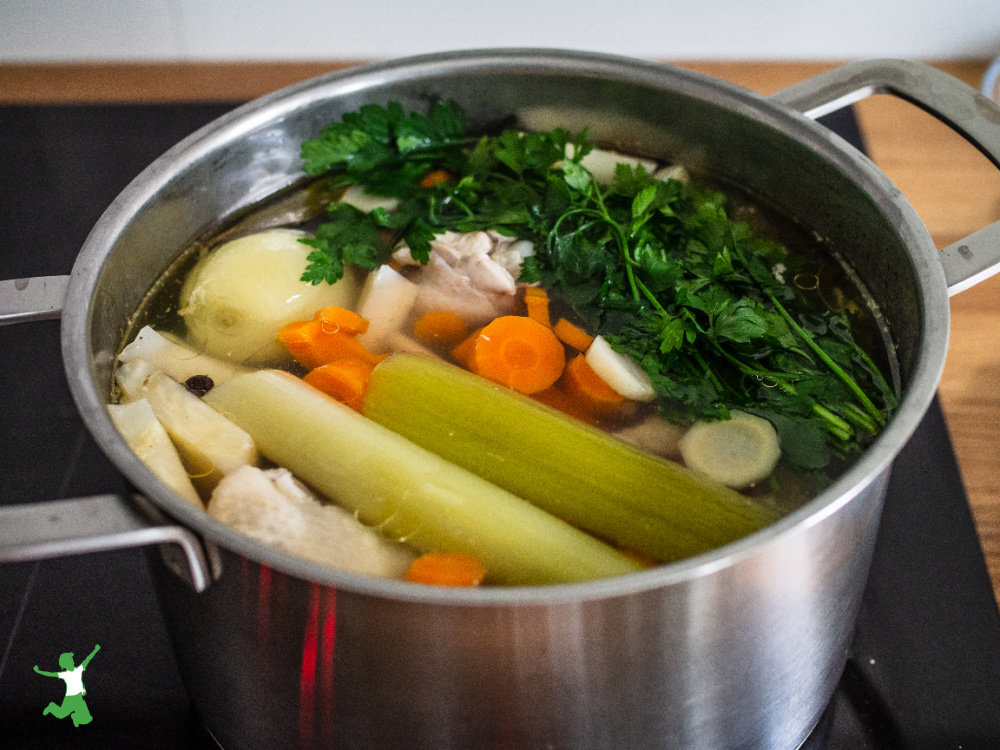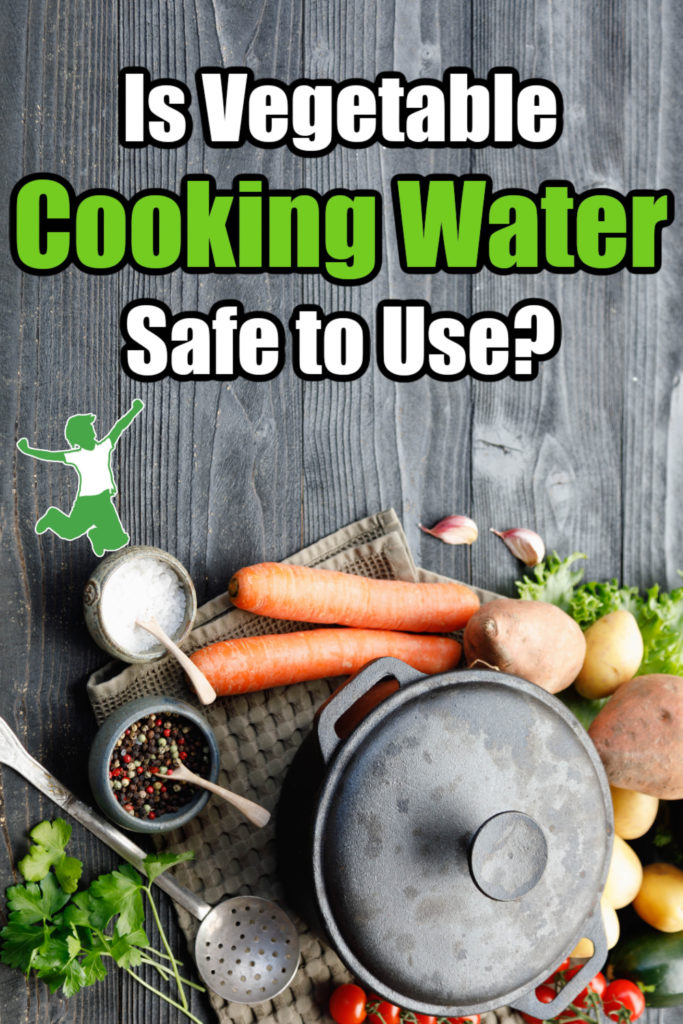Guidelines for when vegetable cooking water is safe to use and when it is best to toss due to nitrites, residues or anti-nutrients that can do more harm than good.

Adelle Davis popularized the practice of saving vegetable cooking water during the Leave it To Beaver era of the American 1950s.
She reasoned that any vitamins and minerals lost from cooking the vegetables would end up in the water.
This supposedly nutrient-rich cooking water could then be added to homemade soups or sauces with the nutrition benefiting those that consumed them.
This notion took hold and has not let go to this day.
Unfortunately, reserving vegetable cooking water can do more harm than good.
Consider the reasons below before you use it in your dishes. How to know your veggie cooking water is safe is discussed as well.
Chemical Residues
If the vegetables that are cooked are not organic, pesticides and nitrites from commercially produced fertilizers can end up in the cooking water.
Even low to no spray veggies such as asparagus would not be safe.
These crops are still typically fertilized with commercial preparations that are high in nitrites.
Anti-Nutrients
Cooking cruciferous vegetables such as broccoli, cauliflower, cabbage, Brussels sprouts, and kale would add goitrogenic (thyroid blocking) substances to the cooking water which should be discarded.
Water used to boil potatoes would contain chemicals called hemagglutinins that disrupt red blood cell formation.
Dark green, leafy vegetables such as beet greens, raw spinach, and chard contain oxalic acid that blocks calcium and iron absorption.
This irritating substance also can cause distress to the sensitive mucous membranes in the mouth and intestinal tract and contributes to the formation of kidney stones.
Consuming raw crucifers or dark, leafy greens is not an alternative either as the substances that cause problems when in the cooking water also cause problems if consumed directly with the vegetable in an uncooked state such as a raw green smoothie.
Legumes & Beans
For the last few years, the vegan community has popularized the trend of reusing legume cooking water, particularly from chickpeas.
This isn’t a safe practice even if the legumes or beans are soaked before cooking.
This soapy, slimy water is called aquafaba and is used as an egg replacement, particularly in dessert recipes. It whips up foamy just like egg whites.
Published research reveals that chickpea cooking water contains saponins, a potent anti-nutrient that contributes to leaky gut, which is at epidemic levels today.
It is also not advisable for pregnant women to consume this substance as it is a miscarriage risk.
Safe Vegetable Cooking Water
Do you really want to use vegetable cooking water as a frugal tool in your kitchen routine?
Consider this list of some of the most popular vegetables below. They are safe to use for that purpose.
- carrots
- turnips
- potatoes (peelings)
- parsnips
- beets
- celery
- organic pumpkins and squash (including zucchini)
- organic onions, leeks, and garlic
- nightshades (tomatoes, eggplant, and peppers among a few others)
For example, this potassium broth recipe uses vegetables simmered in water from the list above.
Simple Guidelines To Follow
Do you find it confusing to remember the distinctions between which organic veggies are safe to use and which are not?
Or, do you buy some veggies organic and others conventional?
If so, it is best to just adopt the practice of not using the cooking water at all.
This is particularly true if you tend to mix veggies together when cooking them.
Never Use Veggie Water for Baby Food
It is of particular importance NOT to use vegetable cooking water for use in pureeing homemade baby food.
Use pure filtered water instead, or if baby is old enough, some homemade bone broth or meat stock.
Final Caution to Consider
One final word of caution.
All vegetables tend to form nitrates after cooking and during storage. These nitrates can transform into strong carcinogens in the intestines.
Hence, it is best to avoid refrigerating and reheating vegetables, particularly leafy, green vegetables which concentrate nitrates when grown commercially.
References
Nourishing Traditions Cookbook









Your new blog looks great!
Really? All those beet greens I just cooked this am I can’t put in the fridge got later? And left overs? Really?
Not a good idea to reheat them. Try to only cook what you will use for that particular meal. Of course, do what you like, but realize there is a price to pay over the long term for consuming reheated veggies. It is not a safe practice.
does this include all veggies (like roots: carrots, beets, parsnip, etc..) or only the green leafy ones?
Steaming veggies makes it easy to ignore the water, which is what we usually do.
Amy — I’m not Sarah, but meat IS healthy for you, from pastured animals! You don’t have to avoid meat entirely; just avoid the factory farmed stuff. We buy all our meat, eggs, and milk from a local farmer. Lightly cooked veggies with raw EVOO or butter are good for you. Raw milk, eggs. Just find a good farmer in your area. http://www.eatwild.com will help you do that.
You said at the end of your article to ” avoid refrigerating and reheating vegetables, particularly leafy, green vegetable which concentrate nitrates when grown commercially.” Do you mean it’s bad to refrigerate lettuce, kale, spinach, and such after we either pick it from our garden or buy it from the store, or do you mean saving in the fridge to reheat later veggies you already served once?
If we’re not to keep fresh greens and such in the fridge, where is a safe place to keep them fresh until we can use them, especially in the summertime if we don’t have a cool, shady spot to keep them?
Hi Sarah,
I’m wondering about the vegetables that i put in my bone broths, when making them.
i usually freeze, immediately, would-have-been-discarded carrots, celery & onion peels from other cooking and save them to throw in the broths while they are cooking. Should i discontinue this practice? Does it make the nitrate count higher in my broth?
And, i too am interested in the soup questions: cooking cruciferous vegetables seperately & storing leftovers.
Leafy greens would be the worst for nitrates, so avoid putting those in soups or anything that would be reheated.
Hi Sarah – I am also curious about making soup. With vegetables like kale, do we need to cook them first before adding them to the soup? And do vegetables that are made into a soup also develop nitrates when stored? Leftover soup is something we really appreciate in our house.
Hi Lori, I do think it is best to steam veggies like kale in water first, discard the water and then add to whatever soup you like. Veggies in soups will form nitrates but much less as they are not exposed to the air (they are in the broth/soup base).
I eat a raw cruciferous salad everyday. And this is supposed to be bad for me? Wow, I’ve never heard this about vegetables before and don’t really want to believe it. What is there healthy to eat besides raw vegetables and fruits? And I definitely do not have the time to cook. And I’ve never cared for meat (nor do I believe meat is good for you due to factory farm conditions).
Amy, eating a raw salad of crucifers everyday is asking for thyroid problems.
So what am I suppose to do? Eat potato chips and cookies everyday? Surely, a salad has to be better than that. I think I’ll keep my salad.
Local meat is so expensive, I could never get the head of my house (who pays the bills) to buy it. I guess I’m just stuck with my thyroid-causing vegetables.
Besides, are you trying to say juicing detox (which is vital to good health) isn’t actually good for you? Because thats how most detoxes are done and meat makes it impossible to detox. Vegetable is used to treat many different health ailments, so how could they be bad for you?
Amy she is talking about eating too many raw cruciferous veggies. There are many any others veggies we just need to keep changing them up. Of course if you eat a salad with those veggies nothing but good things will happen to your body, but if you eat it every day. You know what they say about too much of a good thing right? Sarah so true about non organic. They literally pour chemicals on the food…can you imagine what is in the water….eeewwww. Nice blog. First time here.
@KO- Thank you for the clarification. Well maybe I should consider skipping a day or two or adding some other veggie. I’ve always believed dark green veggies to be the best “superfood” ever and that you should have them everyday to maintain health. Aren’t they a good source of vitamin K and magnesium?
Hi Amy, leafy greens are indeed a superfood. Fantastic stuff .. just lightly steam them to deactivate the baddies (no need to cook them to death) and add butter to improve absorption.
I agree, Amy. I eat a raw spinach salad almost every day and I’m not giving it up. I really don’t think food is this complicated. I do eat meat , though. I buy no hormones, no antibiotic meat(that’s the best I can do).
I jsut love my raw dark green veggies! I do like to eat fish and cheese sometimes thoguh I’ve never thought to put butter on cookied vegetables.
I had read in Nourishing Traditions not to use the cooking water, but I often have leftover veggies. If they should not be reheated what do you do with them? I don’t want to throw them out.
Only cook the veggies that you will use for that meal and don’t refrigerate/reheat.
you can also compost if you do end up with leftovers
don’t compost your veggies with butter or fat on them. Protien in your compost tends to smell and will attract rodents
If you can’t drink the water that carrots have been cooked in.
And you can’t reheat cooked vegetables, what can you do with them,
apart from throwing them out? Thanking you. Dorothy Mangan.
Hi Sarah,
Thanks for such great information about what vegetable cooking water is safe to use (I’ve only ever seen before the recommendation to just throw it all away). I am wondering about soups, though: is it harmful to cook foods like spinach and broccoli directly in a pot of soup? Do you cook them separately and then add it? (I honestly can’t see myself making that much extra work in dirty dishes, but am wondering nonetheless.)
I am also wondering about this. We make soups and broths all the time around here.
I often cook potatoes directly in soups. Should I be cooking them separately and adding them later?
Hi Sarah,
What happens when we cook broccoli, spinach, potatoes, etc in butter or some other fat instead of water? Will their anti-nutrients end up in the fat that we cooked the veggies in?
What I do is steam crucifers in a bit of filtered water, discard the water after cooking and then add sea salt and butter to the still hot veggies. This is the way I’ve done it for years.
This article is confusing because she contradicts herself. She claims “Water used to boil potatoes would contain chemicals called hemagglutinins that disrupt red blood cell formation.” But then she claims “ Vegetable Cooking Water that IS Safe: only the cooking water from organic root vegetables (carrots, turnips, POTATOES, parsnips, and beets)” Tried to give this author benefit of doubt, but she just doesn’t make sense.